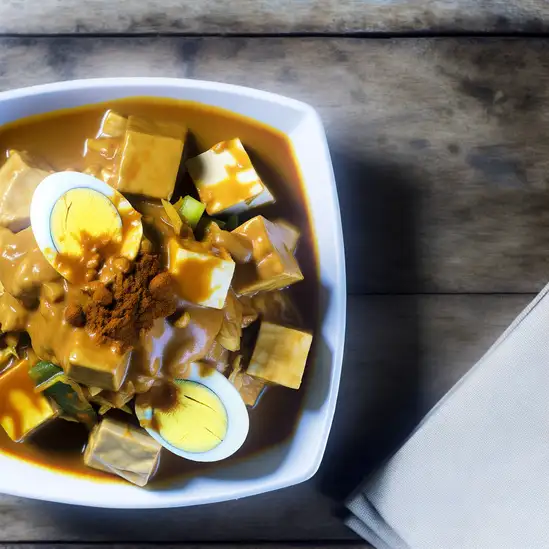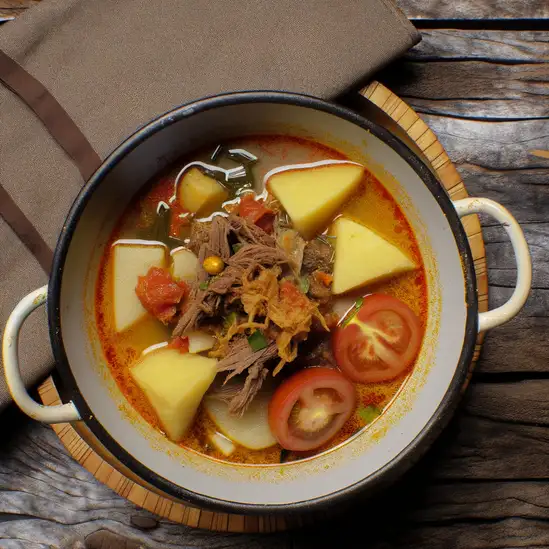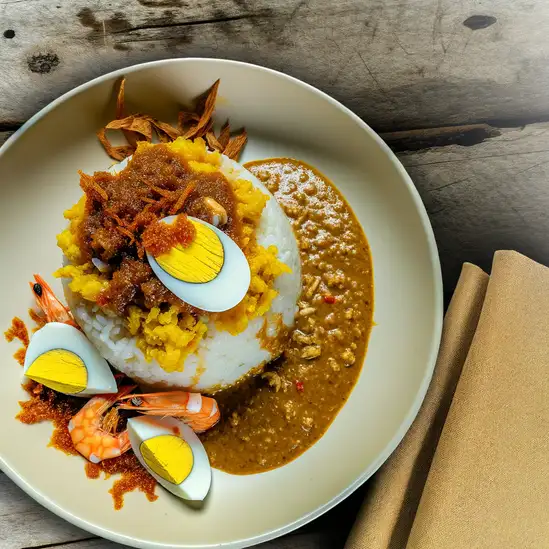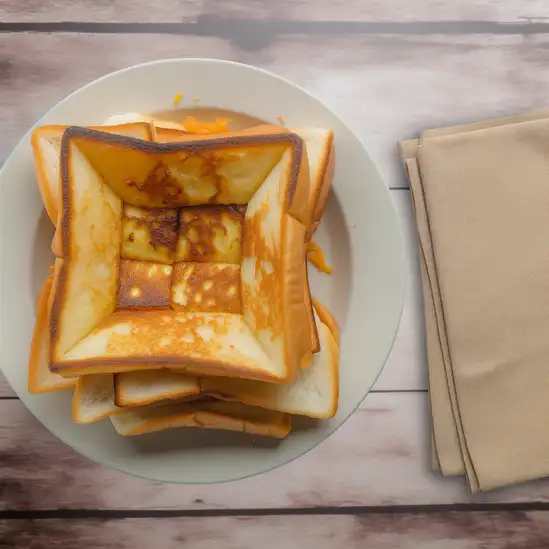



If you find yourself wandering through Kota Administrasi Jakarta Utara,you’ll immediately notice a lively,bustling energy that feels both grounded and refreshingly coastal. This part of Jakarta hums with the rhythm of daily life—fishermen unloading their catch at the port,street vendors calling out their wares,and the salty breeze from the Java Sea mingling with the aroma of sizzling satay and fresh coconut. It’s a place where the city’s pulse meets the sea’s calm,creating a vibe that’s uniquely vibrant yet laid-back. Walking through the neighborhoods,you’ll catch glimpses of old colonial architecture standing shoulder to shoulder with modern buildings,telling stories of Jakarta’s layered history. The sounds of motorbikes weaving through traffic blend with the chatter of locals and the occasional call to prayer,creating a soundtrack that’s unmistakably Indonesian. Don’t miss the chance to explore the lively markets where you can taste freshly grilled seafood or sip on sweet,icy es cendol,a local favorite that cools you down in the tropical heat. What really makes Jakarta Utara stand out is its connection to the water. Whether you’re strolling along the waterfront or hopping on a boat to nearby islands,there’s a sense of adventure and discovery in the air. The community here is warm and welcoming,proud of their maritime heritage and eager to share it with visitors. It’s a place where the city’s hustle softens into the gentle lap of waves,inviting you to slow down and soak it all in.
The information on this page is currently being reviewed by Tripkliq and should be used as a guide only
Eng word: Hello
Eng pronunciation: HAH-loh
Local language: Halo
Eng word: Goodbye
Eng pronunciation: suh-LAH-maht TING-gahl
Local language: Selamat tinggal
Eng word: Thank you
Eng pronunciation: teh-REE-mah KAH-see
Local language: Terima kasih
Eng word: How much
Eng pronunciation: buh-RAH-pah
Local language: Berapa
Eng word: Toilet
Eng pronunciation: TOY-let
Local language: Toilet
Eng word: Help me
Eng pronunciation: TOH-long SAH-yah
Local language: Tolong saya
Eng word: Yes
Eng pronunciation: YAH
Local language: Ya
Eng word: No
Eng pronunciation: TEE-dahk
Local language: Tidak
Eng word: Excuse me
Eng pronunciation: puhr-MEE-see
Local language: Permisi
Sunda Kelapa is the old port of Jakarta and has been a vital trading hub since the 13th century. It played a significant role in the spice trade and was a key point of contact between local kingdoms and European traders.
Fatahillah Square, located in the heart of Kota Tua (Old Town), is named after Fatahillah, the founder of Jakarta. The square is surrounded by colonial-era buildings and is a popular spot for tourists to explore Jakarta's history.
Housed in the former city hall of Batavia, the Jakarta History Museum offers a comprehensive look at the city's past, from prehistoric times to the present. The building itself is a fine example of 18th-century Dutch colonial architecture.
Located in the old Sunda Kelapa harbor, the Maritime Museum showcases Indonesia's rich maritime history. The museum is housed in former Dutch East India Company warehouses and features exhibits on traditional boats, navigation, and maritime trade.
The Wayang Museum, situated in Fatahillah Square, is dedicated to the traditional Javanese art of wayang puppetry. The museum displays a vast collection of puppets from various regions of Indonesia and other countries.
Toko Merah, or the Red Shop, is one of the oldest buildings in Jakarta, dating back to 1730. This historic building, with its distinctive red facade, was once the residence of the Dutch Governor-General and now serves as a cultural heritage site.
Kota Intan Bridge, also known as the Diamond City Bridge, is the last remaining Dutch drawbridge in Jakarta. Built in the 17th century, it once connected the Dutch fort to the city and is a charming reminder of Jakarta's colonial past.
The Bank Indonesia Museum, located in a historic building in Kota Tua, offers insights into the history of banking in Indonesia. The museum features exhibits on the country's economic development and the role of Bank Indonesia.
Luar Batang Mosque, built in the 18th century, is one of the oldest mosques in Jakarta. It is a significant religious site and a testament to the city's long-standing Islamic heritage.
In Kota Administrasi Jakarta Utara, the most common Power Adaptor is Type C, Type F.



A salad of boiled vegetables, tofu, and hard-boiled eggs, topped with a rich peanut sauce.

A traditional Betawi soup made with beef, coconut milk, and a variety of spices, often served with rice and a side of fried shallots.

A Betawi omelette made with glutinous rice, eggs, and shredded coconut, typically topped with fried shallots and served with a spicy sauce.

Toasted bread filled with various sweet or savory toppings, often enjoyed as a snack or dessert.

Fragrant rice cooked in coconut milk, served with various side dishes such as fried chicken, tempeh, and sambal.

A refreshing salad made with pickled vegetables and fruits, served with a spicy peanut dressing.

Chicken congee served with shredded chicken, fried shallots, and a variety of condiments.
Denpasar has this vibrant,lived-in energy that instantly pulls you in. It’s not the polished tourist hub you might expect from Bali,but rather the bustling heart where locals go about their daily lives with warmth and rhythm. Walking through its streets,you’ll hear the hum of motorbikes weaving through traffic,the chatter of market vendors calling out fresh produce,and the occasional clang of temple bells weaving into the city’s soundtrack. The air carries a mix of fragrant spices,sizzling street food,and the earthy scent of incense from nearby shrines.
What I love most about Denpasar is how it feels like a genuine slice of Balinese culture. The city pulses with tradition—colorful ceremonies unfold in the temples,and you’ll spot locals dressed in sarongs,carrying offerings with quiet reverence. At the same time,there’s a youthful buzz in the cafes and art spaces,where creativity bubbles alongside age-old customs. It’s a place where you can savor a plate of spicy babi guling from a humble warung,then wander through the art markets filled with intricate wood carvings and vibrant paintings.
Denpasar invites you to slow down and soak in the everyday magic—the warmth of the people,the rich smells,and the lively streets. It’s a city that doesn’t shout for attention but rewards those who take the time to explore its layers. If you want to experience Bali beyond the beaches,Denpasar offers a genuine,colorful glimpse into the island’s soul.
Surabaya pulses with an energy that’s both vibrant and welcoming,a city where history and modern life dance side by side. As you wander through its bustling streets,you’ll catch the scent of sizzling satay mingling with the salty breeze from the nearby harbor. The city hums with the chatter of locals bargaining in lively markets,the clatter of motorbikes weaving through traffic,and the distant call of street vendors selling fresh tropical fruits. It’s a place where every corner tells a story—from colonial-era buildings standing proudly alongside sleek skyscrapers to colorful murals that splash life onto old walls.
What really makes Surabaya special is its character:tough yet warm,a city that’s seen its share of history but never lost its heart. The people here are fiercely proud and incredibly friendly,always ready to share a smile or a recommendation for the best local warung. Dive into the food scene and you’ll find yourself savoring rich,spicy flavors—like the famous rawon,a dark beef soup that’s both comforting and bold,or the sweet,sticky lontong balap that fills the air with fragrant spices.
Evenings in Surabaya have their own magic. The city lights flicker on,and the streets fill with the sounds of gamelan music drifting from cultural performances or the laughter spilling out of cozy cafes. Whether you’re exploring the historic old town or simply sipping kopi on a street corner,Surabaya invites you to slow down,soak in its layers,and feel the heartbeat of a city that’s alive in every sense.
If you ever find yourself craving a place where the ocean breeze carries the scent of sizzling street food and the hum of lively markets fills the air,Makassar should be at the top of your list. This city pulses with a laid-back energy that feels both vibrant and welcoming,like a friend inviting you to slow down and savor the moment. Walking along the waterfront,you’ll catch glimpses of traditional wooden phinisi boats bobbing gently,their sails catching the golden light of sunset,while fishermen call out to one another in a melodic rhythm that feels timeless.
Makassar’s streets are a feast for the senses. The aroma of grilled seafood—freshly caught and seasoned with local spices—wafts from warungs lining the alleys,tempting you to try coto Makassar,a rich,aromatic beef soup that locals swear by. The city’s mix of Bugis and Makassarese cultures shines through in its colorful markets,where vibrant textiles,handcrafted jewelry,and lively banter create a tapestry of daily life that’s both authentic and inviting.
What really makes Makassar stand out is its blend of old and new. You can explore centuries-old forts and mosques,then hop over to a bustling café where young creatives gather,blending tradition with modern flair. It’s a place where every corner tells a story,and every meal feels like a celebration. Trust me,Makassar isn’t just a stopover—it’s a place that stays with you long after you’ve left.
Manado has this incredible energy that feels both vibrant and laid-back at the same time. When you stroll through its streets,you’re greeted by the lively chatter of locals,the scent of sizzling spices from street food stalls,and the occasional splash of the nearby sea breeze. It’s a place where the warmth of the people matches the tropical sun overhead,making you feel instantly welcome. The city’s colorful markets burst with fresh fruits,exotic flowers,and the catch of the day,inviting you to taste the rich flavors of Minahasan cuisine—think spicy sambal,fresh seafood grilled to perfection,and sweet tropical fruits that melt in your mouth.
What really sets Manado apart is its unique blend of cultures and traditions. You’ll notice the mix of indigenous influences alongside Chinese and Dutch heritage,all woven into the city’s architecture,festivals,and daily life. The local language dances in the air,and the smiles you get from the locals feel genuine,like they’re sharing a piece of their home with you. Beyond the city,the surrounding landscapes are jaw-dropping—lush hills,volcanic peaks,and some of the world’s best diving spots just a short ride away.
If you’re into nature and culture,Manado offers a rhythm that’s both exciting and soothing. Whether you’re wandering through the bustling Pasar Bersehati market,savoring a cup of local coffee,or watching the sunset paint the sky over Bunaken Island,you’ll find yourself drawn into a story that’s uniquely Manado’s. It’s a place that stays with you long after you leave.
If you ever find yourself wandering through Kota Medan,you’ll immediately notice its vibrant pulse—a city where tradition and modern life dance together effortlessly. The streets buzz with the chatter of locals,the sizzle of street food stalls,and the occasional call to prayer echoing from nearby mosques. It’s a place that feels alive,warm,and inviting,like an old friend eager to share stories over a cup of kopi Medan,the local coffee that’s rich,bold,and just a little sweet.
Walking through the city,your senses will be treated to a tapestry of aromas:fragrant spices from bustling markets,the smoky hint of grilled satay,and the fresh scent of tropical fruits piled high in colorful stalls. The architecture is a fascinating mix too—colonial-era buildings standing proudly alongside vibrant Chinese temples and bustling shopping streets. This blend reflects Medan’s diverse cultural roots,where Malay,Batak,Chinese,and Indian influences mingle in everyday life.
What really makes Medan special is its people—their warmth and openness make you feel instantly at home. Whether you’re savoring a plate of soto Medan,a comforting coconut milk soup,or exploring the lively Pasar Petisah market,there’s a genuine friendliness that invites you to slow down and soak it all in. It’s a city that doesn’t just welcome you; it wraps you in its rich,flavorful embrace and leaves you wanting to come back for more.
If you ever find yourself wandering through Yogyakarta,you’ll immediately notice a rhythm that feels both lively and laid-back,like the city is humming a gentle,inviting tune. It’s a place where ancient traditions and youthful energy collide in the most beautiful way. As you stroll down Malioboro Street,the air is thick with the scent of sizzling satay and sweet jasmine from roadside stalls,while the chatter of locals bargaining and the distant beat of gamelan music create a vibrant soundtrack. The city’s heart beats in its art and culture—every corner seems to hold a story,from the intricate batik workshops to the majestic temples of Borobudur and Prambanan just a short ride away.
Yogyakarta’s charm lies in its warmth and authenticity. The people here are incredibly welcoming,often eager to share their crafts,stories,or a cup of strong Javanese coffee. You can feel the city’s deep respect for its heritage,yet it’s also a hub for creative souls,with street art splashed across walls and indie cafes buzzing with young artists and thinkers. The sunsets here are something else—casting a golden glow over the terracotta rooftops and ancient palaces,inviting you to pause and soak it all in.
Whether you’re wandering through the Sultan’s Palace,tasting gudeg (a sweet jackfruit stew) at a local warung,or simply watching the world go by from a cozy café,Yogyakarta wraps you in a sense of belonging. It’s a city that doesn’t just ask you to visit but to stay a little longer,to explore deeper,and to fall in love with its soul.
Scammers may install skimming devices on ATMs to steal tourists' card information and PINs.
Individuals may approach tourists asking for donations to fake charities or causes, often using emotional stories to manipulate them.
Unlicensed money changers may use rigged calculators or sleight of hand to shortchange tourists during currency exchanges.
Imposters posing as police officers may accuse tourists of minor infractions and demand on-the-spot fines.
Scammers may sell counterfeit tickets for attractions, events, or transportation, leaving tourists stranded or denied entry.
Scammers posing as tour guides may offer overpriced or fake tours, providing little to no value.
Tourists renting motorbikes may be accused of pre-existing damage or charged hidden fees upon returning the vehicle.
Crowded areas like markets or public transportation are hotspots for pickpockets targeting tourists' wallets, phones, and other valuables.
Street vendors may charge tourists significantly higher prices for food, souvenirs, or other items compared to locals.
Some taxi drivers may refuse to use the meter and charge tourists inflated fares, especially from airports or tourist hotspots.
Indonesia has very strict drug laws, and this includes Kota Administrasi Jakarta Utara. The possession, use, or trafficking of illegal drugs can result in severe penalties, including long prison sentences and even the death penalty. Tourists should avoid any involvement with illegal drugs and be aware that even small quantities can lead to serious legal consequences.
In Kota Administrasi Jakarta Utara, smoking is regulated under Indonesian national law and local regulations. Smoking is prohibited in public places such as schools, hospitals, public transportation, and government buildings. There are designated smoking areas in some public places, but tourists should look for signs indicating where smoking is allowed. Violations can result in fines.
Vaping is subject to similar regulations as smoking in Jakarta Utara. It is prohibited in public places where smoking is banned. Tourists should be cautious and look for designated vaping areas. The sale of e-cigarettes and vaping products is legal, but there are restrictions on advertising and promotion.
What are other people saying about Kota Administrasi Jakarta Utara?
Recent Social posts about Kota Administrasi Jakarta Utara
There is nothing to show you for now.